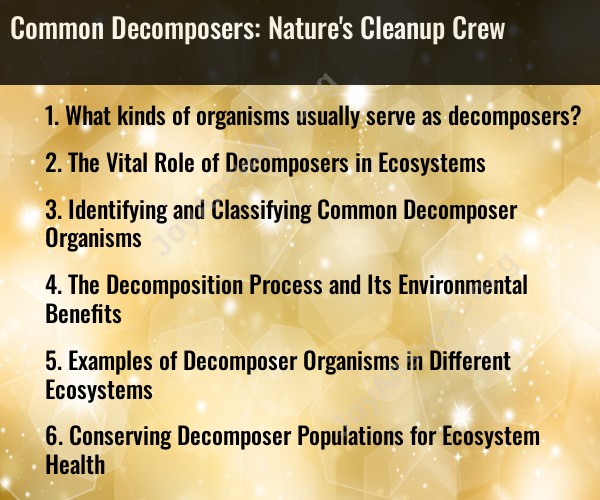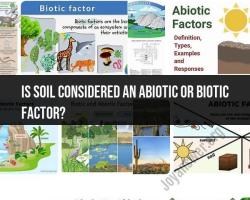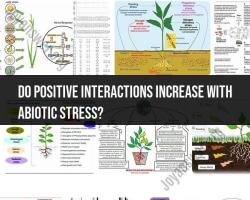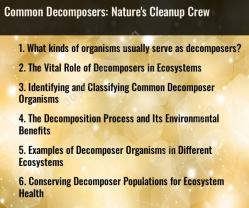What kinds of organisms usually serve as decomposers?
Decomposers, often referred to as "nature's cleanup crew," are organisms that play a vital role in breaking down dead organic matter and recycling nutrients in ecosystems. They help decompose dead plants, animals, and other organic material, returning the essential nutrients to the environment. Common types of decomposers include:
Bacteria: Bacteria are some of the most abundant and important decomposers in nature. They break down organic matter by secreting enzymes that help digest complex organic compounds into simpler forms.
Fungi: Fungi, such as mushrooms and molds, are also prominent decomposers. They obtain their nutrients by breaking down dead or decaying matter through the secretion of enzymes and the absorption of the resulting organic molecules.
Earthworms: Earthworms are essential decomposers in soil ecosystems. They consume decaying plant material and convert it into nutrient-rich castings (worm poop), improving soil quality in the process.
Arthropods: Insects and other arthropods like beetles, ants, and flies are decomposers. They play a role in breaking down organic matter and recycling nutrients, often by consuming decaying plant and animal material.
Mollusks: Certain snails and slugs are decomposers, feeding on dead leaves and other organic material on the forest floor.
Nematodes: Nematodes, or roundworms, are microscopic decomposers that feed on bacteria and fungi, further breaking down organic matter.
Protozoa: Some protozoa, like amoebas and ciliates, also contribute to decomposition by grazing on bacteria and other microorganisms in the soil.
Vultures and Scavengers: While not traditional decomposers, scavengers like vultures play a role in cleaning up dead animals, helping to prevent the spread of disease and hastening the decomposition process.
Microorganisms in Water: Aquatic ecosystems have their own set of decomposers, including aquatic bacteria and fungi, as well as small aquatic invertebrates like water beetles and snails that feed on detritus.
Maggots and Larvae: The larvae of certain insects, like flies and beetles, are effective decomposers. They feed on decaying organic material, breaking it down into simpler forms.
These decomposers are crucial for maintaining ecosystem health and nutrient cycling. They recycle essential elements like carbon, nitrogen, and phosphorus, making them available for other organisms to use in the food web. Without decomposers, dead organic matter would accumulate, and ecosystems would become less productive and more susceptible to disease.
The Vital Role of Decomposers in Ecosystems
Decomposers are organisms that break down dead organic matter into simpler inorganic substances, such as carbon dioxide and water. This process, known as decomposition, is essential for all ecosystems. Decomposers recycle nutrients back into the environment, making them available for plants and other organisms to use.
Identifying and Classifying Common Decomposer Organisms
Common decomposer organisms include bacteria, fungi, insects, and worms.
- Bacteria: Bacteria are microscopic organisms that are found everywhere on Earth. They play a vital role in decomposition by breaking down complex organic molecules into simpler substances.
- Fungi: Fungi are eukaryotic organisms that include mushrooms, yeasts, and molds. They break down organic matter by secreting enzymes that dissolve the material.
- Insects: Many insects, such as beetles and termites, are decomposers. They feed on dead plants and animals, and their droppings help to break down the material.
- Worms: Worms also play a role in decomposition. They burrow through the soil, eating dead organic matter and mixing it with the soil. This helps to improve soil fertility.
The Decomposition Process and Its Environmental Benefits
Decomposition is a complex process that involves a variety of different organisms. The first step in decomposition is the breakdown of dead organic matter into smaller pieces. This is done by scavengers, such as birds and mammals, and by decomposer organisms.
Once the dead organic matter is broken down into smaller pieces, decomposer organisms begin to break it down further into simpler substances. This process is known as mineralization. Mineralization releases nutrients, such as nitrogen and phosphorus, back into the environment.
Nutrients that are released by decomposer organisms are essential for plant growth. Plants absorb these nutrients from the soil and use them to produce food. Animals then eat the plants, and the nutrients are recycled back through the ecosystem.
Decomposition also plays an important role in climate change mitigation. Dead organic matter contains carbon, which is a greenhouse gas. When decomposer organisms break down dead organic matter, they release carbon dioxide into the atmosphere. However, decomposer organisms also absorb carbon dioxide from the atmosphere. This helps to balance out the amount of carbon dioxide in the atmosphere and mitigate climate change.
Examples of Decomposer Organisms in Different Ecosystems
Decomposer organisms are found in all ecosystems, from forests to deserts to oceans.
- Forests: In forests, decomposer organisms help to break down dead leaves, branches, and trees. This process releases nutrients back into the soil, which are then used by plants to grow.
- Deserts: Decomposer organisms also play an important role in deserts. They help to break down dead plants and animals, and their droppings help to fertilize the soil.
- Oceans: In the oceans, decomposer organisms help to break down dead plankton and other marine organisms. This process releases nutrients back into the water, which are then used by algae and other marine plants to grow.
Conserving Decomposer Populations for Ecosystem Health
Decomposer populations are essential for ecosystem health. However, decomposer populations can be threatened by a number of factors, such as pollution, habitat loss, and climate change.
It is important to conserve decomposer populations in order to protect ecosystems. Here are some things that can be done to conserve decomposer populations:
- Reduce pollution. Pollution can harm decomposer organisms and disrupt the decomposition process. Reducing pollution can help to protect decomposer populations.
- Protect habitats. Decomposer organisms need habitats to live in. It is important to protect habitats, such as forests and grasslands, in order to protect decomposer populations.
- Mitigate climate change. Climate change can disrupt the decomposition process and harm decomposer populations. Mitigating climate change can help to protect decomposer populations.
By conserving decomposer populations, we can help to protect ecosystems and ensure that they remain healthy and productive.




